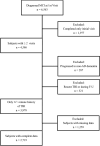Traumatic brain injury history and progression from mild cognitive impairment to Alzheimer disease
- PMID: 29809031
- PMCID: PMC5975979
- DOI: 10.1037/neu0000431
Traumatic brain injury history and progression from mild cognitive impairment to Alzheimer disease
Abstract
Objective: To examine whether history of traumatic brain injury (TBI) is associated with more rapid progression from mild cognitive impairment (MCI) to Alzheimer's disease (AD).
Method: Data from 2,719 subjects with MCI were obtained from the National Alzheimer's Coordinating Center. TBI was categorized based on presence (TBI+) or absence (TBI-) of reported TBI with loss of consciousness (LOC) without chronic deficit occurring >1 year prior to diagnosis of MCI. Survival analyses were used to determine if a history of TBI predicted progression from MCI to AD up to 8 years. Random regression models were used to examine whether TBI history also predicted rate of decline on the Clinical Dementia Rating scale Sum of Boxes score (CDR-SB) among subjects who progress to AD.
Results: Across 8 years, TBI history was not significantly associated with progression from MCI to a diagnosis of AD in unadjusted (HR = 0.80; 95% CI [0.63, 1.01]; p = .06) and adjusted (p = .15) models. Similarly, a history of TBI was a nonsignificant predictor for rate of decline on CDR-SB among subjects who progressed to AD (b = 0.15, p = .38). MCI was, however, diagnosed a mean of 2.6 years earlier (p < .001) in TBI+ subjects compared with the TBI- group.
Conclusions: A history of TBI with LOC was not associated with progression from MCI to AD, but was linked to an earlier age of MCI diagnosis. These findings add to a growing literature suggesting that TBI might reduce the threshold for onset of MCI and certain neurodegenerative conditions, but appears unrelated to progression from MCI to AD. (PsycINFO Database Record
(c) 2018 APA, all rights reserved).
Figures



References
-
- Abisambra JF, Scheff S. Brain injury in the context of tauopathies. Journal of Alzheimer's Disease. 2014;40:495–518. - PubMed
-
- Cedarbaum JM, Jaros M, Hernandez C, Coley N, Andrieu S, Grundman M, Bruno V. Rationale for use of the Clinical Dementia Rating Sum of Boxes as a primary outcome measure for Alzheimer’s disease clinical trials. Alzheimer's & Dementia. 2013;9:S45–S55. - PubMed
Publication types
MeSH terms
Grants and funding
LinkOut - more resources
Full Text Sources
Other Literature Sources
Medical

